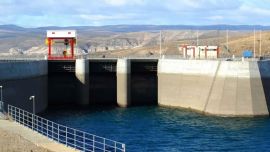Diego Alejandro Celentano, aged 33. Héctor Raúl Figueroa, aged 42. Marcos Iván Daloia, aged 38. Bruno Nicolás Bussanich, aged 25. Let us give names to the victims of the umpteenth outbreak of narco violence in Rosario. In order to prevent adding them as just another cold statistic, the data that shows the city’s homicide rate is five time as high as the national average.
As with so many other matters, Argentina’s leaders have not lived up to the challenge of efficiently combatting drug-trafficking. Yet it would be a mistake, an all-too easy one, to confine the responsibility for Rosario’s bloody violence solely to politics. Sectors of the justice system, the security forces, business leaders, the financial world, the nation’s union apparatus, the media and even parts of civil society (football, among them) have tolerated or adopted the growth of the activity.
The gunning down of Diego, Héctor, Marcos and Bruno have triggered a scenario in Rosario which was already explosive. Drug gangs have decided to inspire terror among the people in reprisal for both the clampdown by the Santa Fe Province Government, which has increased inspections at the Piñero prison, “Bukele style”, and decided to broadcast the show on social networks.
The bloodbath was followed by the repeated deployment of federal forces in the territory. Led by Security Minister Patricia Bullrich (who is always sprinting to react and show up for the cameras), some 450 officers will be deployed around the city, 100 at a time. To provide context, the security operation for the local football clásico between Rosario Central and Newell’s Old Boys demands 1,000 police officers – and that’s with no visiting fans present.
The Armed Forces will now join the contingent in Rosario, with Defence Minister Luis Petri (another skilful publicist) at the helm. Although it is worth noting that military support is for logistical matters, that backing is curious because the Armed Forces lack the necessary resources to be deployed.
Bullrich took the chance to make political reproach, citing the failure to approve the so-called ‘ómnibus bill,’ but before the shootouts she had not sent a single Border Guard to Rosario. And, while she was at it, she requested new laws to combat “narco-terrorism”. The laws in force suffice (if applied, of course), unless she decides to innovate and seek changes to the military’s role.
Army chiefs are privately admitting that they are far from enthusiastic about Operation Rosario. Besides the legal and material limitations, they can’t even have necessary weapons to defend themselves, to do a job that will expose them. To make matters worse, when they look at Petri’s communication strategy, they suspect they are being used politically for personal promotion.
It is true that both Bullrich and Petri do not have a very high bar to clear. It takes little to improve upon the performance of the responsible ex-officials from the previous administration: Sabina Frederic, Aníbal Fernández (both Security), Agustín Rossi and Jorge Taiana (Defence).
Yet the narco issue goes beyond security matters, although it does include them. The actual coordination of national and provincial forces is welcome, regardless of photos and press conference. Sharing criminal intelligence to face up to drug-dealers and having the federal courts target top bosses would be even more welcome, as would an investigation into the tracing of the money routes: how, who, where the multi-million-dollar funds generated unlawfully are laundered.
It is also hypocritical to limit the Argentina’s narco problem solely to Rosario. Police chiefs and court officers in other provinces, besides Santa Fe, have had to be removed over links with drug-traffickers and that is only the cases that have been brought into the limelight.
In this respect, it is touching to see the messages of solidarity for Santa Fe Province Governor Maximiliano Pullaro (who lives under constant threats, as do the other members of his family) from many of his peers, who would still rather throw stones in glass houses when it comes to what happens in their districts with narcos. Rosario is always near and what is happening there is more common than we realise.
Taking the issue seriously carries risks. Silver or lead, says the mafia. An offer that is hard to resist. Without the need for coups and media spectacles, it is time to start fighting the fight seriously. And not just with guns. As a society we deserve it. The families of Diego, Héctor, Marcos, Bruno and thousands of other victims, above all, deserve it.




















Comments